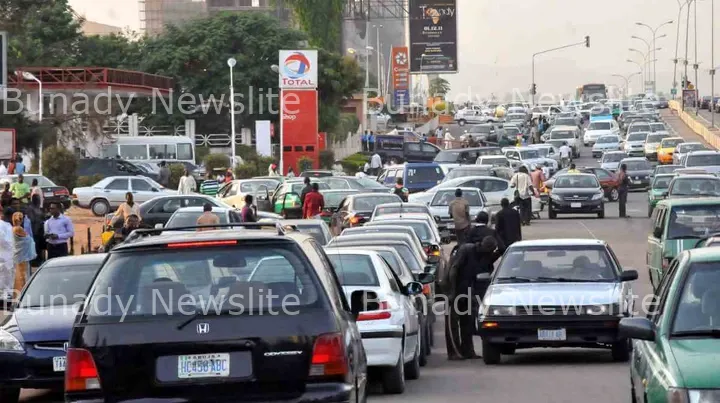Naija News understands that the few stations that are open have long queues of motorists waiting to buy petrol, leading to frustration and gridlock in major cities.... CLICK TO READ THE FULL NEWS HERE▶▶
In Abuja, several NNPC and Conoil filling stations had long queues, with some motorists waiting for hours to buy fuel. Others, such as Salbas, Gegu Oil, and Eterna, were closed due to lack of product.
The situation was similar in Niger State, where many filling stations, including NNPC retail outlets, were shut, leading to massive queues at the few stations that were open.
In Lagos and Ogun states, only filling stations owned by major marketers were dispensing fuel, with long queues reported at many outlets. Independent marketers were unable to get fuel supply, leading to closures and a rise in transport fares.

The Nigerian National Petroleum Company Limited retail outlet in Iyana-Woro had a long queue of vehicles waiting to buy petrol. The NNPC Retail outlets usually sell PMS at prices below N600/litre in Lagos, but dispense it at N617/litre in Abuja and environs.
Also, the Heyden filling station along Iyana-Woro, MRS at Alapere, Conoil, TotalEnergies, and Mobil along Alahusa Secretariat all had long queues as they sold a litre of PMS between N617 and N650.
Drivers who could not wait in the queues said they had to patronise the independent marketers who sell between N700 and N900/litre.
The scarcity has also led to an increase in black market activities, with petrol being sold at exorbitant prices, up to N1,500 per liter.
Depot operators confirmed that they were rationing petrol due to low supply, and it may take up to a week to restore normalcy.
“Nothing has changed as of Monday. The depot owners have started rationing the little they have. Depots are loading, but at snail speed, and this was occasioned by the paucity of product,” a depot operator told The PUNCH.
Another source hinted that the planned hunger protest might worsen the situation.
“This scarcity will be with us till the weekend because supply dislocation takes a minimum of one week to get to normalcy. If the movement of trucks during protest is affected, it will get worse,” he added.
The NNPC has attributed the fuel scarcity to a hitch in the discharge operations of a couple of vessels.
However, despite assurances, the situation has continued to deteriorate. The company said it was “working round the clock with all stakeholders to resolve the situation and restore normalcy in the operations.”
Many Nigerians are skeptical about the NNPC’s assurances, given the persistent fuel scarcity.
“We have heard this before, and nothing has changed. The NNPC needs to do more to address this scarcity,” said a motorist waiting in line to buy fuel.
The fuel scarcity has also had an impact on businesses, with many shutting down due to lack of fuel. “We can’t operate without fuel, and it’s affecting our business,” said a business owner.











